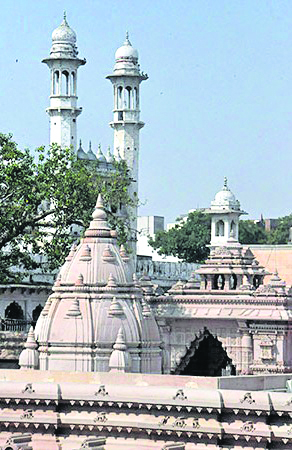


Kashi’s Gyanvapi case has once again reached the Supreme Court. Advocate Vishnu Jain, on behalf of the Hindu parties, has filed a petition seeking permission to conduct a scientific survey of the Shiva Linga found in the sealed area of Gyanvapi without causing any damage to it. Apart from this, a petition has also been filed that 10 basements in premises should be opened and surveyed, which are covered artificially.
The Hindu side has filed first application in the Supreme Court saying that survey should be done in a scientific manner without harming the Shivalinga. At present, Shiva Linga area (Muslims call it VajuKhana) in the disputed premises is under heavy security of Central Armed forces by the order of the Supreme Court. At the same time the Hindu side wants permission to worship it considering it to be the Shivalinga of Adi Vishweshwar. Whereas the Muslim side calls it a fountain and is asking for permission to perform ablution.
The Hindu side says that this area has no religious importance for Muslims because according to them there is an alleged fountain there. The modern construction has been deliberately done to hide the original features associated with the Shiva Linga such as the Peetha, Peethika etc. The Hindu side has said that the area of Shivalinga has been surrounded by erecting artificial walls.
In another petition of the Hindu side, a demand has also been made to open the sealed area in Gyanvapi. In the petition, the Supreme Court has been requested to withdraw the order banning the survey in the sealed area. The application also demands opening of 10 basements of Varanasi Mosque sealed with artificial walls at the disputed site and permission to conduct scientific survey in them through ASI.
Earlier, Vishwa Hindu Parishad international working president and senior advocate Alok Kumar on Saturday said the evidence collected by the ASI from the Gyanvapi structure confirms that the mosque was constructed after demolishing a grand temple. He said that a part of the temple structure, especially the western wall, is what remains of a Hindu temple. The report also proves that parts of the pre-existing temple, including pillars and pillars, were reused with modifications in the construction of the mosque.
Alok Kumar also said that the evidence collected and findings given by the ASI prove that the religious character of this place of worship was in existence on August 15, 1947 and at present it is as a Hindu temple. Thus, as per Section 4 of the Places of Worship Act, 1991, the structure should be declared a Hindu temple.
While the arrangement committee of the mosque has currently refused to accept the report of the scientific survey of the Gyanvapi complex, the Left-leaning historian Irfan Habib has said that the report is correct. He has also said that whatever was found there gives evidence of the existence of a temple. However, he has also asked whether every mosque will continue to be dug up like this.
On the other hand, the Hindu side is going to make the statement of historian Irfan Habib a big issue. And Irfan is planning to present Habib’s statement during the debate on the petition for opening of 10 basements of Gyanvapi and scientific survey of Shiva linga.